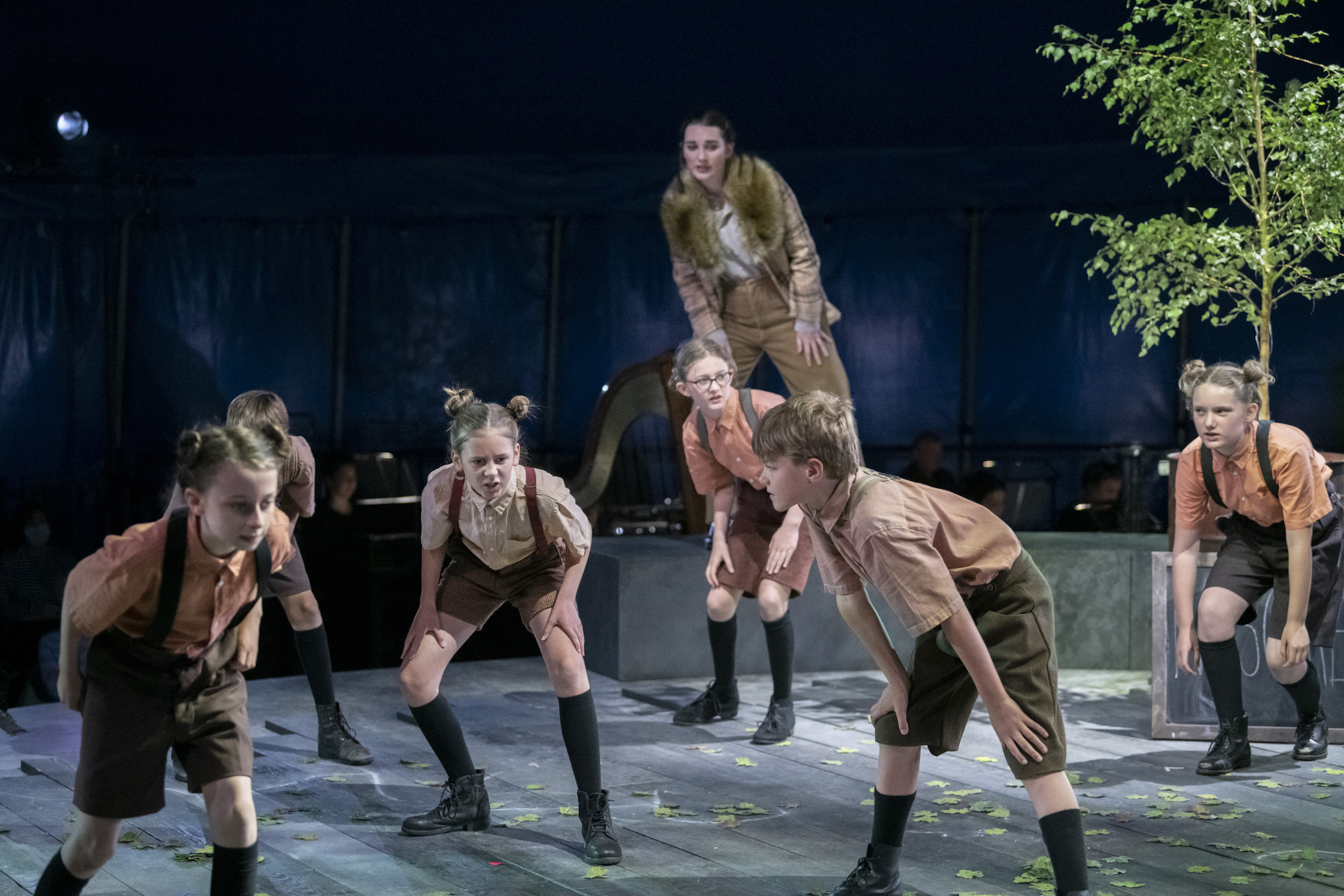There are advantages and disadvantages about opera-in-the-round, and it’s a format that suits some operas better than others. Longborough’s Cunning Little Vixen, staged by Olivia Fuchs in their new big-top tent, makes the very most of the advantages and pushes the disadvantages into the shade, without entirely obliterating them. It’s a lively show, very well sung, cleverly, energetically acted and directed; but the problems, of which more below, refuse quite to go away.
This is a production under the festival’s Emerging Artists scheme combined with its Youth Chorus, and I have to say that it’s wonderful to see so many children, teenagers and young professional singers all together on the stage and performing with such enthusiasm and vitality after all these months when even such performances as were grudgingly permitted have been reduced to a skeleton staff, or beamed from drawing rooms or studios by two or three shirtsleeved musicians in a family bubble.
Fuchs’s Vixen (in David Pountney's English, plus some minor naughtinesses) throws all that to the winds, crowding the stage with people and action while managing without the forest clutter that usually goes with Janáček’s musical strip cartoon about the forester-gamekeeper’s love-hate relationship with the natural world around him. Instead she casts a sharp light on the actual emotions, the love of Vixen Sharp-Ears and the Fox Gold-Spur, and above all the Forester’s own barely comprehended passion for the vixen, whom he in some curious menopausal way identifies with past human loves, and through that with ageing and the seasonal cycle.
 The long duet between the vixen and the fox is superbly delivered by two young sopranos, Julieth Lozano and Frances Gregory. Kieran Rayner, a young baritone from New Zealand (pictured right), gives a finely sung, skilfully rounded portrait of the Forester; and there is a whole gallery of first-class performances in the smaller roles, especially by Aaron Holmes as the poacher Harašta, Gabriel Seawright as the drunken Schoolmaster, and David Howes as the Priest and the grumpy old Badger (a doubling indicated by the anticlerical Janáček, who was evidently tickled by the parallel).
The long duet between the vixen and the fox is superbly delivered by two young sopranos, Julieth Lozano and Frances Gregory. Kieran Rayner, a young baritone from New Zealand (pictured right), gives a finely sung, skilfully rounded portrait of the Forester; and there is a whole gallery of first-class performances in the smaller roles, especially by Aaron Holmes as the poacher Harašta, Gabriel Seawright as the drunken Schoolmaster, and David Howes as the Priest and the grumpy old Badger (a doubling indicated by the anticlerical Janáček, who was evidently tickled by the parallel).
But the real spirit of the production lies in the comings and goings, the creatures great and small (not always clearly identified, but no matter), the cockerel (Lucy Mellors, excellent) and his hens, whom the feminist vixen lectures about their subservience to a conceited male but then proceeds to slaughter the lot of them, and not least the procession of fox cubs in the last act (pictured below with Frances Gregory) (“how many have we had?” asks the fox; “I’ve lost count,” replies the vixen). Which is important, by the way, because the season comes round with a new fox and a new vixen and the world is the same, oblivious of us humans and our anxieties. The aptly named Ms Fuchs handles all this with consummate resourcefulness, helped by Nate Gibson’s economical but witty designs, full of light touches, the scattering of leaves, tables and chairs put to all kinds of use, as one might do, much more clumsily, in some improbable home Vixen. The children are superb; but they would be, wouldn’t they?
 My reservations lie with the orchestra, ably conducted by Justin Brown, but in a reduction (by Jonathan Lyness) that alas distorts Janáček rather badly. It’s true that balance is often a problem with Janáček’s own orchestration, but it simply won’t do to reduce him to thirteen players (including string quartet) without radically rethinking the proportions. Mozart and Schubert could write for such combinations, but Janáček didn’t, and the result deprives him of vital contrasts and a crucial richness and range of colour, almost from the very first few bars. I would say that Lyness has done a good job with the means at his disposal, but I’d rather he had completely rescored the work for a different thirteen. He will laugh (and probably spit), and I shan’t blame him.
My reservations lie with the orchestra, ably conducted by Justin Brown, but in a reduction (by Jonathan Lyness) that alas distorts Janáček rather badly. It’s true that balance is often a problem with Janáček’s own orchestration, but it simply won’t do to reduce him to thirteen players (including string quartet) without radically rethinking the proportions. Mozart and Schubert could write for such combinations, but Janáček didn’t, and the result deprives him of vital contrasts and a crucial richness and range of colour, almost from the very first few bars. I would say that Lyness has done a good job with the means at his disposal, but I’d rather he had completely rescored the work for a different thirteen. He will laugh (and probably spit), and I shan’t blame him.
In any case it was well worth his efforts, which enabled this delightful evening to happen.














Add comment